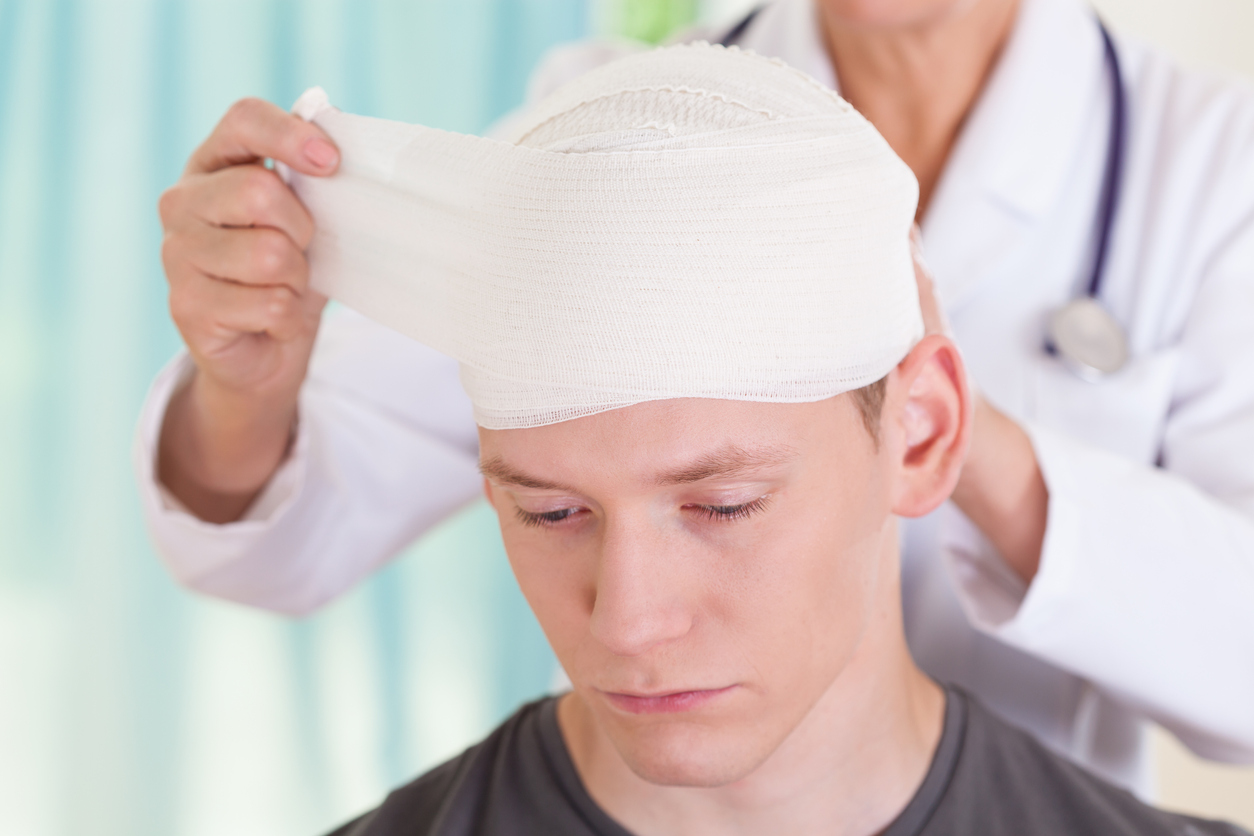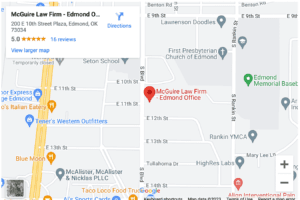Concussion Injury Attorney in Oklahoma City

Doctors describe concussions as “mild brain trauma.” But “mild” merely refers to the fact that patients rarely die from concussions.
The symptoms and effects of concussions can be quite severe. You might suffer cognitive, motor, and sensory symptoms from a concussion. These effects could last several months to several years. Concussions can also bring about behavioral and mood changes that can last a lifetime.
Here is a short guide with information about concussion injuries and their effects.
How Do Concussion Injuries Happen?
The skull contains a layer of cerebrospinal fluid (CSF) to cushion the brain. The skull and CSF cooperate to protect the brain from impacts.
When you bump your head, the skull prevents the object from damaging your brain. The CSF dissipates the force of the bump and slows the motion of your brain.
But when some forces can cause your brain to slosh so violently that the CSF and skull cannot prevent brain damage. Some of these forces include:
Blunt Trauma
Your head might collide with an object with such force that it causes your brain to slosh inside your skull. This might happen when something hits your head, like a falling object at a construction site. It can also happen when your head hits something, like the ground after a fall.
Whipping Motion
You can also sustain a concussion without suffering head trauma. If you experience a rapid change in speed, your head and neck might whip so violently that your brain sloshes in your skull. You might experience a whipping motion strong enough to cause a concussion while playing contact sports, falling from a height, or in a car accident.
What Are the Symptoms of a Concussion?
A concussion happens when a force causes the brain to move so violently in the CSF that a pressure wave forms in the CSF. The pressure can damage brain cells and rupture small blood vessels in the brain. The damage sustained by the brain cells causes inflammation in the brain.
This cell damage, bleeding, and inflammation combine to cause symptoms that include:
- Headache
- Dizziness
- Nausea
- Blurred vision or seeing stars
- Tinnitus
- Drowsiness
- Loss of coordination and balance
- Confusion
- Amnesia
- Irritability
Doctors have no treatments for a concussion. Instead, they will usually prescribe rest. They will also recommend that you refrain from any activity that might risk another head injury, such as contact sports.
Your doctor might excuse you from work if you experience headaches or cognitive symptoms like confusion and memory loss.
Concussion symptoms often have delayed onset. You might not feel the effects of a concussion for a few hours or even days after your accident.
These symptoms usually last a few weeks. But some patients will experience symptoms that persist for several months.
Doctors refer to symptoms that last longer than two months as post-concussion syndrome. Post-concussion syndrome usually affects patients over 40 who have experienced depression, anxiety, or post-traumatic stress disorder with their concussions.
What Are the Risk Factors for a Concussion Injury?
Almost any accident can lead to a concussion. But some accidents pose an increased risk of concussion, including:
Car Accidents
car accidents can create whipping forces that cause the brain to slosh in the skull. Even a low-speed collision can subject the brain to powerful G-forces.
Concussions often accompany whiplash, a neck strain caused by the whipping of the head in a car crash.
Falls
When your head hits the ground after a fall, the sloshing of your brain can cause a concussion injury. A concussion can happen after a slip and fall accident or a fall from a height.
Workplace Accidents
Workplaces contain many concussion hazards. Head trauma can result from workplace accidents, especially when an accident involves heavy machinery or falling objects.
Bicycle, Pedestrian, and Motorcycle Accidents
Bicycle accidents and motorcycle accidents can cause head trauma and concussions. This can happen when a vehicle hits you or when your head strikes the pavement.
Wearing a helmet can substantially decrease the risk of a concussion. Research suggests that bicycle and motorcycle helmets reduce the risk of a severe head or brain injury by as much as 69%.
Pedestrian accidents can also cause concussion injuries when the car hits you or you hit the pavement.
Unlike bicyclists and motorcyclists, most pedestrians do not wear protective helmets. 35% of children and 27% of adults injured in a pedestrian accident will experience head and trauma that can lead to a concussion.
What Are the Long-Term Effects of a Concussion?
In some cases, concussions can cause long-term health problems, including:
- Behavioral changes
- Mood swings
- Difficulty concentrating
- Memory loss
- Sleep disorders
- Depression
- Anxiety
These cognitive and emotional issues might require months or years of counseling and therapy. They might even interfere with your ability to work and participate in the hobbies and activities you enjoy.
What Compensation Can I Recover for a Concussion Injury?
You can recover compensation for a concussion injury resulting from someone else’s negligence. To prove negligence, you must prove that a person or business failed to act in a reasonably prudent way and you suffered a concussion as a result.
If you can establish negligence, you can seek to recover your economic and non-economic damages that stem from the concussion.
Your economic damages will include your past and future medical expenses for treatment, therapy, and medication for your injury.
If you missed work or had to change jobs due to your injury, your economic damages should also include your lost income.
Non-economic damages are designed to compensate you for your pain, mental anguish, inconvenience, and lost activities after an injury or accident.
With a concussion, you could suffer headaches for several weeks or longer. Sleep problems, depression, and anxiety could cause you substantial mental suffering.
Your concussion might force you to change your routine in meaningful ways. You might need to rely on family and friends for assistance to perform daily tasks. You might even need to give up activities you enjoy, like exercise.
Each of these losses can support a claim for non-economic damages.
Contact an Oklahoma City Personal Injury Lawyer for Help
You shouldn’t have to suffer extreme financial and physical consequences because of another party’s negligence or intentional acts. When you’ve had a concussion, it’s a good idea to seek out legal counsel.
Contact us at McGuire Law Firm for a free consultation to learn about the compensation you can recover for your concussion injury. Our Oklahoma City personal injury lawyers will talk through the facts of your case and present legal strategies to help you move forward.

